

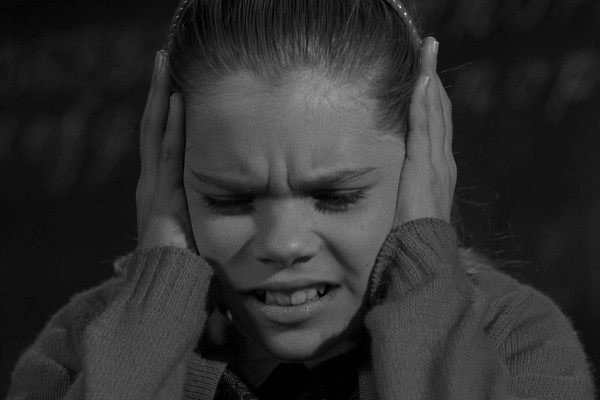
One of two Richard Matheson scripts for the season (along with Death Ship), Mute has the intriguing premise of a girl who has grown up in a family of telepaths. Sadly, despite some good performances, the story has mixed messages about how the girl is treated: her family are burned to death in a fire, and a would-be adoptive mother dotes on her simply because she's a replacement for her dead daughter. Also in the line-up are a telepathic teacher who psychologically abuses the girl to the point of a nervous breakdown, and a telepathic couple who deliver to each other (and, by association, the viewers) a sermon that love is more important than her gifts. It rings out as both a plea for the "norm" - which isn't the girl's norm - and an acceptance of what amounts to mistreatment of a child. All of which is wrapped up and presented to the viewers as the most unlikeliest of "happy" endings. Lastly, look out for the door number of the adoptive parents... as with He's Alive, they live at number 331, but it appears to be slightly different number panels. What was it with the series and this number?
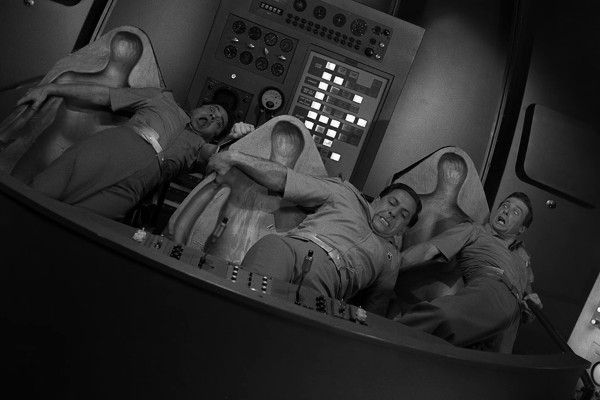
Jack Klugman makes his third of four Twilight Zone appearances, and there's never been an episode he couldn't elevate. Here the laws of fate, death and chance all play into a compelling tale about a group of starship travellers who foresee their own deaths. The idea of a starship in 1997 looking like a 1950s set-up might be quaint, and there is perhaps the feeling that starship captain Klugman insists that his men go through things methodically just so the 50 minute runtime can be reached, but it all works well enough.
Klugman's crew are adequate, but, sadly, prone to melodrama in the face of his stoic delivery - as pictured, this can produce unintentional amusement. Then there's the twist ending... a good one, but the fourth time it had appeared in the series. It's more logical and thought-out than in other instances, though as the episode is so heavily based around it, it might make this a "single viewing" experience.
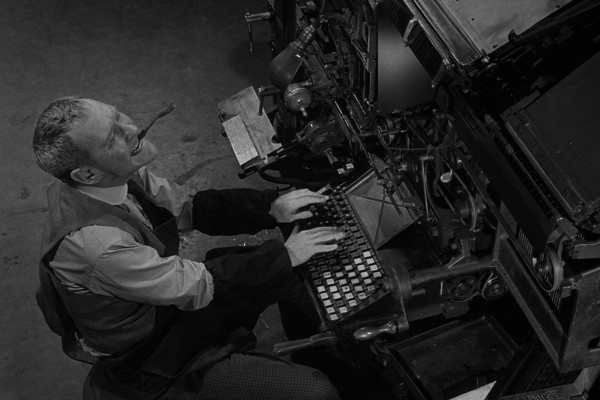
Burgess Meredith's fourth and final appearance in the series, starring as a mysterious newspaper benefactor in this witty Charles Beaumont comedy. An age where the line "I'm afraid this time you've pulled a boner" could be said without any double meaning, there are scant elements that date it. Meredith, compelling as he is, seems to be practising for arguably his most famous role of The Penguin, still three years in the future, and the incidental music can be a little obnoxious.
However, Robert Sterling is great as the unlucky newspaper editor being aided by the Devil, and his rapport with Meredith is superb. The longer the screenplay goes on, the more sinister Meredith gets, a form of Satan who can create the future just by typing up news stories about it. The term "printer's devil", incidentally, is now somewhat archaic and largely forgotten to history: it was a name in the print trade given to office juniors. Its inclusion as the title of this episode is one more illustration of Beaumont's wit.
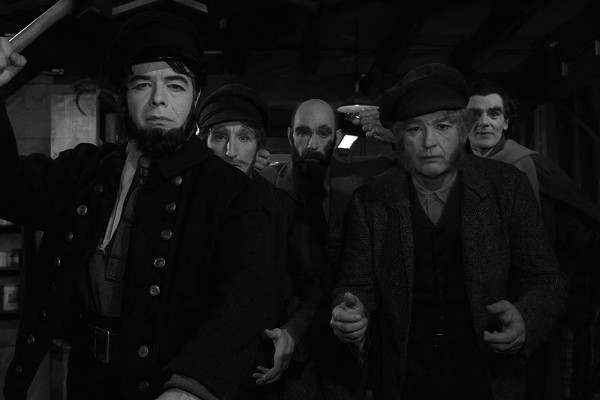
Jerry Sohl was the author of 23 novels, as well as two works of non-fiction. His writing for the screen extended to programmes like The Outer Limits and Star Trek, where he gave the world, amongst others, the "The Corbomite Maneuver". The New Exhibit was the first of three scripts Sohl wrote for the Twilight Zone, followed by the season five entries Living Doll and Queen of the Nile. However, all three scripts were written for Charles Beaumont, who had become deeply ill. Credited under Beaumont's name, the fees were split down the middle, and Beaumont's reputation was continued with a stellar episode like this one, despite the fact that he never wrote it.
For a series that touches on the supernatural, it's striking that The Twilight Zone is rarely flat-out scary. Any slack is more than gathered up here, as a star of Psycho (Martin Balsam) contends with a group of wax exhibits which come to life. More gory than nearly any other episode, there is the feeling that it would have been even better served in the 25 minute timeslot, but, while stretched out like many other season four episodes, this one contains enough incident to justify its inclusion.
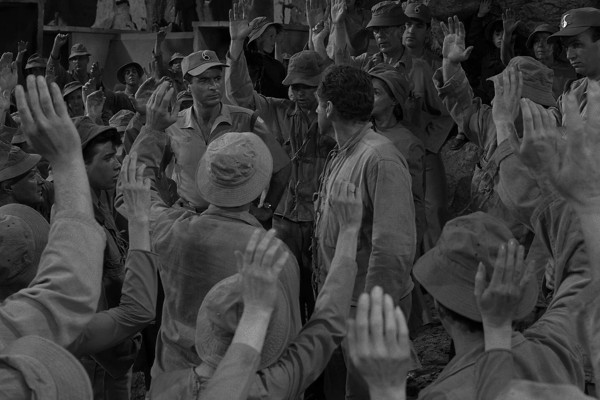
On Thursday We Leave For Home is set in the year 2021, where a colony from Earth has been on an alien world for 30 years. Possessing two suns, the atmosphere is unbearable, and the restless colonists are kept in line by the religious teachings of Captain Benteen (James Whitmore, one of the finest performances of the series). Sixteen minutes in and a rescue ship arrives, which changes the trajectory of the story entirely, causing Benteen to become paranoid about losing his control. The angry chemistry between Whitmore and the visiting captain played by Tim O'Connor is palpable, and it's hard not to feel for Benteen, even if he's trapped in his own delusion. The final scene, which follows a beginning where some colonists found suicide the only option, is particularly tragic.
The Twilight Zone should never be judged on its production values; indeed, many of the stage-bound "exteriors" could be poetic and evocative. However, the first season's experiment with filming in Death Valley seems a long way away as an entire planet is created in the studio, largely via cheap photo blow ups. It's the difference between a setting that attempts to be "real", and a setting that's more lyrical... when the intent is realism, it can distract. This said, with one of the largest casts ever assembled for an episode of The Twilight Zone, transporting them all to a genuine location would have been hugely problematical. Credit, however, must be given to an impressive underground cave set. (The same can't really be said for an appalling stunt double for the tightly-coiffured Whitmore, who has hair that flaps all over the place).
Serling regarded the fourth season as a failed experiment, and cited this episode (which he wrote) as the only effective instalment, even though he confessed to overwriting it. It's a little hard, as there are some decent episodes, even if there are maybe only three or four that actually benefit from a longer length, this one included. Serling had proved the series could work as a lengthier production with the proto-pilot The Time Element, and it has to be factored in how quickly these scripts were written: Jess-Belle, in particular, had to be churned out in a week. With a longer notice and planning period from CBS, it's entirely possible that the writers could have come up with something really great, instead of a season that's likely to be skipped in favour of one with regular length episodes.
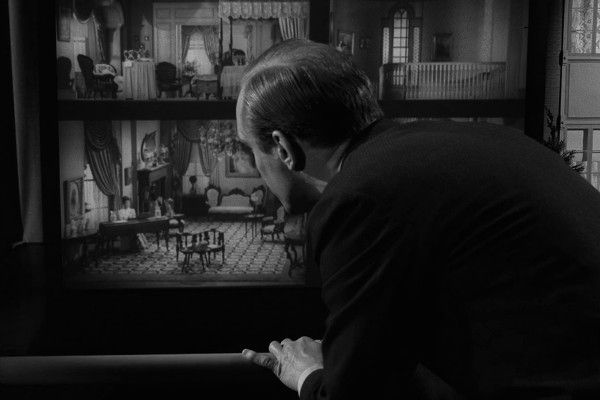
Season four is a frequently lacklustre outing, based on a format which arguably doesn't suit the show, or the show hadn't had the time to adjust to. However, while many of the episodes are below par or just plain forgettable, it does provide two or three classics, with Miniature a genuine contender for an all-time top ten. Robert Duvall gives a supremely tender, sensitive performance as a man who doesn't fit in, and mentally opts out to the private lives of a doll's house. In today's world Duvall's Charley Parkes would probably be diagnosed as on the autistic spectrum and sue for unfair dismissal, but the 60s was a very different time.
Much is made of the fact that the episode was taken out of syndication reruns while a lawsuit was pending from someone claiming to have submitted the same idea. When it was eventually settled, the episode was represented to the public as part of a special package, where it received the big new fad of 1984: colorisation. However, for viewers in the UK this was not such a hardship, as episodes were scarcely repeated, and so any Twilight Zone episode on TV was, by definition, a rare screening.
Out of all the season four episodes, Miniature arguably fits the format best, having the most developed subplots, rather than padding. There's also the fun of seeing actors connected to the series in both its past and (spiritual) future: the manager firing Charley is Barney Phillips (three prior episodes, but most famously the three-eyed Venusian in Will The Real Martian Please Stand Up?, while his psychiatrist is William Windom, (Five Characters in Search of an Exit), who would later star in the Rod Serling Night Gallery episode They're Tearing Down Tim Riley's Bar.